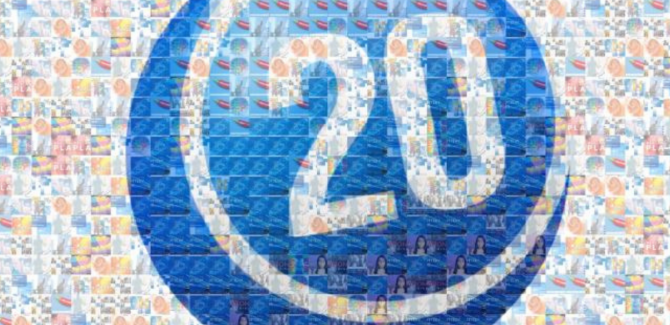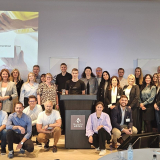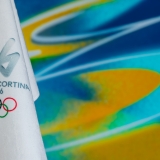
Back to the Future! EL & WLA celebrate 20 years of lottery marketing success
With many decades of lottery marketing behind us, EL and WLA brought together 370 participants to celebrate 20 years of their annual iconic marketing event, normally held in London and seen as the opening of the new lottery year. Moderated by EL Secretary General, Arjan van’t Veer and WLA Executive Director, Luca Esposito, for the second year in a row the event had to take place online.
EL President Hansjörg Höltkemeier and WLA President Rebecca Paul opened the webinar highlighting how marketing has evolved over the last two decades. Technological advancements, innovation, behavioural change, responsible gaming and sustainability have all had a fundamental influence on marketing trends.
During the pandemic, we can even say there has been a revolution in marketing. Partial or full closures of retail outlets and national lockdowns all had differentiating effects on the game verticals. Lotteries put contingency measures in place and found innovation solutions to continue regulated services to their players.
The online channel was further developed as a safe alternative with popularity continuing to grow in the post pandemic era. Marketing strategies have continued to be adapted to support society both financially and non-financially. Opportunities and challenges of course remain but the past years have shown the versatility, flexibility, and efficiency of national lotteries.
Two Decades of the Biggest Lottery Marketing Trends
Ray Bates, Honorary EL President outlined a shift in marketing trends during his Keynote speech. From Amazon and Google in the late 90s to Facebook, LinkedIn, Twitter, Youtube and more recently Instagram, Snapchat and TikTok, the development of social media platforms has played a role in changing advertising and branding, also in the lottery sector. The attention span of individuals is much less and nowadays society and culture often dictate what ‘’matters’’ and happens in branding.
As ‘’Cultural Branding’’ depicts a lifestyle that is culturally relevant to the brand audience, it has become more relevant, especially during the recent crisis where society falls back on ‘’culture’’ to influence decisions.
According to Ray, ‘’in 20 years, lotteries have shown resilience, innovation, and creativity, but within constraints of regulation, responsible gaming for the good of society. In the words of Leonardo da Vinci, lottery is like Art. Art lives from constraints and dies from freedom’’.
Post pandemic era: The Great Marketing Outlook 2022
CEO Lottery Panel
The webinar was enriched by discussions with CEOs from lotteries and suppliers. Moderated by Ray Bates, the panel with lottery CEOs - Gretchen Corbin, Georgia Lottery, USA and NASPL President; Romana Dernovsek, Loterija Slovenije, d.d., Slovenia; Hansjörg Höltkemeier, Deutsche Klassenlotterie Berlin and EL President, Germany; Mario Musa, Hrvatska Lutrija d.o.o., Croatia, and Francesco Parola, IGT Lottery S.p.A., Italy – discussed interesting learnings from the pandemic. All CEOs agreed that their lotteries have become faster in their operations, more flexible, efficient, and motivated. Company culture has also become more important, for example with employees learning to work in different ways, retailers adapting to the new situation and internal communications evolving.
Regarding the growth of online play, this was not seen as an unnatural change, and it is agreed that additional players recruited to online play during the pandemic would stay. Although there will be players (generally older) who will revert back to their usual ‘’habits’’ for example returning to their usual retail outlines, online play will continue to grow in the post-pandemic era. Ray Bates concluded the discussion with how retail “omnichannel” can be criticised as a term, but digitalisation of retail is a reality and would continue to expand. The panel agreed that lotteries must provide more interesting support at retail, and responsible gaming would remain high on the agenda.
Suppliers’ Executives Panel
Moderated by Rebecca Paul as WLA President, the panel with Suppliers’ Executives including Jay Gendron, Chief Operation Officer Lottery, IGT, USA, Patrick McHugh, Executive Vice President & Group Chief Executive Lottery, Scientific Games, USA and Doug Pollard, Chief Executive Officer, Pollard Banknote, Canada, discussed actions being taken to ensure a sustainable industry that protects the environment and grows business responsibly, such as receiving WLA certification, adhering to the UN Global Compact, working on social programmes with employees and customers worldwide, and taking measures to reduce greenhouse gas emissions.
It was agreed that collaboration between suppliers and lotteries to consistently advocate the industry’s responsible operations and support of countless good causes around the world will help regulators differentiate lotteries from other gaming operations, when legislating, and strengthen the fight against illegal betting operators present in many jurisdictions globally.
With the overall trend of digitalisation and the shift from broadcast advertising to one-to-one messaging, the panel highlighted the need for lotteries to engage closely and effectively with players to deliver the products players want and gain their loyalty. They noted the need to maintain point of sale advertising for retail, which is still very important, given the significant growth of instant ticket sales in many markets. They also reminded that they could help lotteries solve issues. The development of innovative solutions, such as an app for cashless payment of winnings, speeding up payments and addressing the issue that retailers have less cash on hand than in the past.
From TV draws, digital marketing to retail and the customer journey
The event brought together diverse and inspiring marketing campaigns to share with participants. During the three consecutive sessions, lottery professionals and experts from different national markets around the world, reflected on important marketing themes such as TV game shows and live draws, advertising, sustainability, and digitalisation as well as looking ahead to future marketing trends, challenges, and opportunities.
El Gordo, the traditional annual Christmas draw by SELAE in Spain since 1815 tells a story all about the values of (Spanish) society – humanity, solidarity, and generosity. Presented by María Núñez, Journalist & Press and Communications Secretary at SELAE, El Gordo conveys heart felt beauty to help us understand the underlying dynamics that make the game so powerful and uniquely important. The marketing is extremely clever as it focuses on the importance of sharing as the essence of the ‘’brand’’ as well as the power of emotion, family, friends, togetherness, hope, and love.
Imme Rog, Chief Marketing Officer, Novamedia/Postcode Lotteries highlighted the importance of television to reach players. As the Postcode Lottery is 100 percent subscription-based (without points of sale) a sense of ‘’disruption’’ in the marketing strategy is often felt. Television is one of the most visible and fun ways to reach out to players, reinforced by the well know hosts and ambassadors.
Regarding retail, Roger Soleim, Head of Omnichannel distribution at Norsk Tipping focused on the state of play in Norway. Due to a rapid change in the market, there has been an increasing trend from retail to mobile. 90 percent of customers are already registered through digital channels which means Norsk Tipping digitalises the customer onboarding journey in retail as well. Concepts are tailored to different audiences and for different ‘’arenas’’. For example, the retailer receives a commission for a short time period if the customer plays through the digital platforms after registering with the retailer. Norsk Tipping has completely digitalised its sport betting product with 95% of customers using the digital channels for sports betting. In early February, betting program and play slips were no longer printed. For Norsk Tipping, three strategic objectives include actively contributing to a society with less problematic gambling behaviour, creating Norway’s best digital customer experience and developing a flexible, agile and efficient organisation.
From retail to the customer journey, Shannon Dehaven, Vice President, Digital Engagement, Pollard Banknote, Canada focused on how optimising the digital connection that is transforming the industry goes beyond retail and online sales in order to understand the modern consumer behavior. It is all about delivering players what they want, wherever they are. Dehaven noted that the more information lotteries have about their players, the more they can understand them, tailor offerings, as well as watch for and inform them about potential problem gaming. Today’s players define their own journeys. They care about relevance, simplicity, convenience, and seamless transitions between digital and offline channels. Dehaven stressed that lotteries should develop both retail and digital channels of products that are easy to purchase, since many players carry out activities in both settings.
Andrew Varley, Head of Performance Marketing & Alistair Pitkin, Performance Marketing Manager, Tabcorp, Australia presented on future digital marketing. Privacy is a hot topic in Australia as the government reviews the Privacy Act. With amendments expected on personal information, consent and the right to erasure of personal data, it may no longer be possible to track behavioral data through cookies.
Varley and Pitkin underscored the need to reassess marketing approaches. It will be key to know your audience by growing customer registration to legally access their data and better understand who they are; start developing cookie replacement solutions that help reach customers, and finally build an audience-first measurement approach by tracking addressable customer rates.
Sharon Duncalf, Vice President, Global Insights & Planning, IGT, UK outlined what has been learnt about player motivations and behaviour impacting lottery play over the past years. Speaking of global trends, global ilottery has developed rapidly due to accelerated digital transformation and technology advancements like the Cloud and artificial intelligence. Duncalf highlighted a key finding from the Foresight Factory report on new trends that will shape consumer demand and behavior in 2022, of an overall change in personal pace coupled with the need to focus on what really matters in life. Building on this, lotteries can demonstrate their broad portfolio of in-home entertainment with games that appeal to different paces; consider end to end digital journeys for audiences that prefer not to be in stores and offer entertainment to players where and when they choose. Duncalf also touched on ways the lotteries can embrace the metaverse and apply digital proxies to their brand to promote and educate in virtual worlds and find new audiences.
Peter Ter Weeme, Chief Social Purpose Officer & VP, Player Experience, BCLC, Canada emphasised how social purpose can future proof a business. A Social Purpose Company is a company whose enduring reason for being is to create a better world. It is an engine for good, creating social benefits by the very act of conducting business. Its growth is a positive force in society. The benefits of social purpose include attracting, retain and engaging customers, recruiting, retaining and motivating employees, enhancing stakeholder relationships, strengthening social capital, improving financial performance and increasing innovation. Emerging themes from the BCLC social purpose journey including building a world where everyone has an equal chance, to grow happiness and wellbeing through play and to bring people and communities together to raise everyone’s game.
Finally, Chris ALLEN, VP Marketing, Scientific Games, UKA reviewed the great success of scratch cards which have grown in many markets over the past twenty years, surpassing 50 billion dollars alone, in the US, in 2019. Almost 35% of all lottery sales globally are generated from paper scratch cards in an industry whose growth has gone from millions to billions. 45 years of industry innovation has focused on players, produced new price points, products, and experiences. Lotteries have embraced new technologies for changing player behavior. This innovation has allowed growth while connecting players to the lotteries and the social causes they support.
The advent of the Internet and high uptake of mobile phones has changed the way people live, work, play and interact through social media and other similar platforms. In concluding, Allen noted that the future would revolve around data, which drives expansion and digital engagement of players and offers the patterns for the future to optimize portfolios across all games.
EL and WLA would like to thank all speakers and participants, as well as CIBELAE, ALA and NASPL, for the fruitful discussions and support. Both associations hope to reconnect in person in 2023 for the next edition of the EL/WLA Marketing event!






